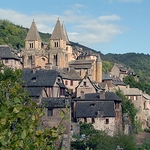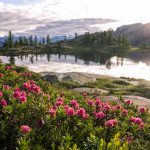Lucy Daltroff offers up her Guide to Anhui Province as it throws open Its beautiful doors to embrace more overseas visitors.
It is a view I will never forget. Before me are thin jagged mountains surrounded by clouds, encircled by pine trees that seem to be growing out of sheer rock faces with unique branch formations that seem to be beckoning me in for a closer look.
I’m in Huangshan, visiting the Yellow Mountains of eastern China. Up to now, a less visited tourist site in this massive country. This is about to change as Anhui Province, where this mountain range is to be found, has recently expanded its tourism budget to open up their many attractions to more international tourists.
It is an exciting place to explore. I flew to Hong Kong and then took another flight of just over two hours to Hefei the capital city of the province – but a place I had never heard of before. My first reaction after a long flight, was to indulge in the ultra-luxurious and cheap accommodation. Every well-known hotel group seems to be represented in this city, but prices appear to be less than half of what Europeans currently pay for the same facilities and service. So certainly, the infrastructure is there for an expanded tourist population.

In common with many cities in China, Hefei has completely expanded in the last 50 years with a current population of a whopping 12.5 million. I didn’t spend much time there, but it brought to mind the famous quote which may or not be true “that they use more concrete in one day in China than in 10 years in any European country”.
In contrast the province itself is historic and has been described “As a living museum of Chinese History” It is in the Yangtze River delta with beautiful rivers, scenery and is known for its tea, food, opera and science facilities, All the same these Yellow Mountains are perhaps its most famous offering and have been painted many times by Chinese painters over the centuries. Their location is both a national park and UNESCO World Heritage Site and named after the legendary Chinese Emperor Huang Di, the “Yellow” Emperor.
Whilst there is an option to climb 60,000 granite steps, I plump for one of the four cable car rides to the top, where paths safely wind round some of the most impressive viewpoints. The mountains offer views of the clouds from above, they resemble a sort of fluffy ocean, which is why so many of the vistas have the word “Sea” in them. I entered via the “West Sea Canyon”. There are stopping places to take stock, and one high peak even boasts a hotel. So, it is possible to rest and enjoy the views in absolute comfort although there are still quite a few steps to navigate – not steep – but numerous.

All the time I passed local porters carrying heavy loads on wooden poles balanced across their shoulders, with bags hanging on each end. This bought me back to the reality of the hard work involved in servicing us visitors. It was not until I was coming down that I saw the trails from the cable car windows and how extensive they are and how far I had walked.
On another day I visited, Xuancheng perhaps most famous as the place where paper, as we know it, was first invented in AD 105 by Ts’ai Lun, a court official.
Its importance has been recently recognised by a magnificent new museum and visitor centre, where just the entrance foyer, which symbolises realms of paper, is spectacular in itself. The explanations (could we have more of them in English please) explore in detail how it was made from natural fibres, hemp rags and mulberry bark, soaked and turned into a pulp, pressed to remove the water, made into sheets and then dried in the sun. Of course, it is more complicated than that and altogether there are 108 separate processes involved over three years!


The majority of ancient Chinese books and paintings that survived are because they were well preserved on Xuan paper which has qualities of strength, clear texture and resistance to corrosion, moths and mould. It was an invention that aided, art, literature, education, literacy and bureaucratic accounting – but the technique didn’t reach Europe until the 12th Century.
On the furthest side of the museum is a facility that is still making the paper today and visitors can watch the different processes and even help in the production. There is a shop to buy the paper as well.
Xidi and Hongcun
There are many extremely ancient villages to see in Anhui and two of them, Xidi and Hongcun, have become UNESCO World Heritage Sites because of the preservation of both their architecture and their layout as examples of typical rural villages in feudal China.
Hongcun used in the movie Crouching Tiger Hidden Dragon, is a bit touristy, but romantic and atmospheric and I found exploring the many backstreets and alleyways a much better way of getting the feel of it. As you enter under the archway the lake is lined with Chinese art students on assignments, which is picturesque in itself. Strangely many of them wanted to take selfies with us – as western faces are still quite unusual here. The architecture and carvings of the 150 residences date back to the Ming and Qing dynasties and are among the best of their kind in China.


As for food in Anhui Province, it is varied and plentiful. A lot of herbs grow in the local fertile valleys and are included in most of the dishes. Stewing and braising is more popular than stir-fries and local fresh river fish, especially shrimps can be found. Egg dumplings are popular as well as Tofu which is mainly really tasty – my only problem was the stinky tofu (fermented) – which is probably just an acquired taste!
It was a real privilege to visit this corner of China that still awaits being discovered by the majority of overseas visitors.
Tell me more about this guide to Anhui Province
Please visit Make it China for more information on visiting Anhui Province.
A 22 day all inclusive rail tour of China by Wend Wu Tours – including the Yellow Mountains, is £5,540 per person.
Alternatively return flights from Heathrow to Hefei include one stop and cost from £394.
Hilton Hotel in Heifei costs from £52 per night.






